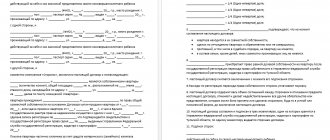Inheritance in Russia
Legal provisions affecting inheritance and the participation in it of such a figure as a notary are enshrined in the Civil Code of the Russian Federation. Section five of part three of the Code is devoted to this issue. Of course, there are also a number of other norms in force, but the foundations are laid precisely in the Civil Code of the Russian Federation.
Let us note that inheritance is not only the property of the deceased (apartment, car, land, etc.), but also property rights and obligations. Except for what is connected with the person himself, i.e., his personality - we are talking about alimony or compensation for harm.
According to the provisions of the law, you can become an heir: with a completed will, under an inheritance agreement or by law. The opening of the inheritance occurs on the day of death. If the court recognizes a person as deceased, the inheritance opens on the day the decision came into force.
Method of inheriting common property
In this case, the surviving spouse, when inheriting by law, is the heir of the first priority.
(Article 1142 of the Civil Code of the Russian Federation).
To inherit an apartment that is the common joint property of spouses, after the death of one of the spouses, the surviving spouse must complete the following steps.
To register inheritance rights and rights to the marital share (share in an apartment), you will need:
- death certificate of the testator;
- marriage registration certificate;
- a certificate from the place of residence of the deceased or another document confirming the place of opening of the inheritance (Article 1115 of the Civil Code of the Russian Federation);
- documents for the apartment (purchase and sale agreement, certificate of ownership, cadastral passport, certificate from the technical inventory bureau about the appraised value of the apartment, extract from the Unified State Register, certificate from Rosreestr);
- identification document;
- will (if any).
To register ownership of an apartment (share in an apartment), the surviving spouse must submit to the notary:
- application for the issuance of a certificate of ownership of a share in the right of common ownership of property (apartment) acquired during the marriage. The application must indicate the object of inheritance, its characteristics, cost, location, cadastral number, and also attach the necessary documents. (Art. 75 Fundamentals of the legislation of the Russian Federation on notaries).In the application, you can indicate that the marriage contract was not concluded, since a marriage contract can change the regime of joint ownership to the regime of shared or separate ownership of the property of the spouses. (Article 42 of the Family Code of the Russian Federation).If the spouses have not determined their shares in the ownership of joint property, then in the event of the death of one of the spouses, his share is determined in the amount of 1/2 of the joint property. (Clause 2 of Article 254 of the Civil Code of the Russian Federation). Notary fee for issuing a certificate of ownership for a share in an inherited apartment - 200 rubles (clause 11, part 1, article 22.1 of the Fundamentals of the legislation of the Russian Federation on notaries);
- application for acceptance of inheritance (Article 1153 of the Civil Code of the Russian Federation).
Since a six-month period has been established for accepting an inheritance, you must contact a notary to register ownership of the apartment within this period.
(Article 1154 of the Civil Code of the Russian Federation).
For issuing a certificate:
- children, including adopted children, spouse, parents, full brothers and sisters of the testator - pay a state duty of 0.3 percent of the value of the inherited property, but not more than 100,000 rubles;
- other heirs - 0.6 percent of the value of the inherited property, but not more than 1,000,000 rubles.
(Article 22.1 of the Fundamentals of the legislation of the Russian Federation on notaries; paragraph 22, paragraph 1, Article 333.24 of the Tax Code of the Russian Federation).
Individuals are exempt from paying the state fee for issuing certificates of the right to inheritance when inheriting, in particular, an apartment, if these persons lived together with the testator on the day of the testator’s death and continue to live in this house (this apartment) after his death.
(Clause 5 of Article 333.38 of the Tax Code of the Russian Federation).
The issuance of a certificate of ownership of an apartment is not subject to any deadlines. The notary will notify the heirs who accepted the inheritance of the apartment about issuing to the surviving spouse a certificate of ownership of his share in the common property (apartment) of the spouses.
(Article 75 of the Fundamentals of the legislation of the Russian Federation on notaries).
After six months have passed from the date of death of the testator, the notary will issue a certificate of the right to inherit the apartment.
(Clause 1 of Article 1163 of the Civil Code of the Russian Federation).
Step 4. Register certificates of right to share and inheritance of the apartment in Rosreestr and obtain a certificate of state registration of the right to this apartment.
The remaining spouse must contact the territorial department of Rosreestr at the location of the apartment with an application for state registration of rights to the apartment, as well as with the following documents:
- identification document (original) of the spouse;
- certificates of right to share and inheritance (original and copy);
- an agreement on the division of inherited property (apartment) between spouses, if any.
(Article 1165 of the Civil Code of the Russian Federation).
For state registration of rights to an apartment, you must pay a state fee. The state duty is 2000 rubles.
(Clause 22, Clause 1, Article 333.33 of the Tax Code of the Russian Federation).
Submission of a document confirming payment of the state duty along with an application for state registration of rights to an apartment and other documents is not required.
The applicant has the right to submit a document confirming payment of the state duty to the body that carries out state registration of rights to property (apartment) on his own initiative.
(Clause 4 of Article 16 of the Law of July 21, 1997 N 122-FZ “On state registration of rights to real estate and transactions with it”).
For reference. If information on payment of the state duty is not available in the State Information System on state and municipal payments and the document on payment of the state duty was not submitted along with the application for state registration of rights to the apartment, the documents required for state registration of rights to the apartment will not be accepted for consideration.
(Clause 4, Article 16 of Law No. 122-FZ “On state registration of rights to real estate and transactions with it”).
The period for state registration of rights to an apartment should not exceed 10 working days from the date of receipt of the application and necessary documents.
We suggest you read: What to do if a pipe bursts in your apartment
(Clause 3, Article 13 of Law No. 122-FZ “On state registration of rights to real estate and transactions with it”).
For reference.
First of all, we will give some clarifications, namely, inheritance is carried out by will and by law. Inheritance by law takes place when and since it is not changed by a will, as well as in other cases established by the Civil Code of the Russian Federation (Article 1111 of the Civil Code of the Russian Federation).
Accordingly, you, being an heir, must accept it in order to acquire the inheritance. Acceptance by the heir of part of the inheritance means acceptance of the entire inheritance due to him, no matter what it is and no matter where it is located (Article 1152 of the Civil Code of the Russian Federation).
1. Acceptance of an inheritance is carried out by submitting, at the place of opening of the inheritance, to a notary or an official authorized in accordance with the law to issue certificates of the right to inheritance, an application from the heir for acceptance of the inheritance or an application from the heir for the issuance of a certificate of the right to inheritance.
If the heir's application is transferred to the notary by another person or sent by mail, the heir's signature on the application must be certified by a notary, an official authorized to perform notarial acts (clause 7 of Article 1125 of the Civil Code of the Russian Federation), or a person authorized to certify powers of attorney in accordance with clause. 3 Article 185.1 of the Civil Code of the Russian Federation.
- took possession or management of inherited property;
- took measures to preserve the inherited property, protect it from encroachments or claims of third parties;
- made at his own expense expenses for the maintenance of the inherited property;
- paid the testator’s debts at his own expense or received funds due to the testator from third parties.
1. Contact the notary directly and enter into inheritance;
2. Do not contact a notary, provided that you have actually taken possession or management of the inheritance; took measures to preserve the inherited property, protect it from encroachments or claims of third parties; incurred expenses for the maintenance of the inherited property at their own expense; paid the testator’s debts at your own expense or received money due to the testator from third parties, but this path may have a side effect for you, which can later be expressed by establishing the fact of your acceptance of the inheritance in court.
It is also necessary to know that an inheritance can be accepted within six months from the date of opening of the inheritance (Clause 1 of Article 1154 of the Civil Code of the Russian Federation) by submitting an appropriate application to a notary for acceptance of the inheritance or in another way, or in court after the specified 6 month period (if there is a dispute about the right).
Step 1. Prepare the necessary documents.
— death certificate of the testator;
— marriage registration certificate;
- a certificate from the place of residence of the deceased or another document confirming the place of opening of the inheritance (clause 1 of Article 1115 of the Civil Code of the Russian Federation - The place of opening of the inheritance is the last place of residence of the testator (see also Article 20 of the Civil Code of the Russian Federation);
- documents for the apartment (purchase and sale agreement, certificate of ownership, cadastral passport, certificate from the technical inventory bureau about the estimated value of the apartment (cadastral valuation of the apartment), extract from the Unified State Register, certificate from Rosreestr. These documents can be obtained by submitting a request to GBU MFC - Multifunctional center at the location of the real estate);
— identification document;
- will (if such a thing exists).
Step 2. Contact the notary at the testator’s last place of residence.
- application for the issuance of a certificate of ownership of a share in the right of common ownership of property (apartment) acquired during marriage (Article 75 “Fundamentals of the legislation of the Russian Federation on notaries”, approved by the Supreme Court of the Russian Federation on 02/11/1993 No. 4462-1) . The application must indicate: the object of inheritance, its characteristics, cost, location, cadastral number, and also attach the necessary documents.
In the application, you can indicate that a marriage contract was not concluded, since a marriage contract can change the regime of joint ownership to the regime of shared or separate ownership of the property of the spouses (Article 42 of the RF IC). If the spouses have not determined their shares in the ownership of joint property, then in the event of the death of one of the spouses, his share is determined in the amount of 1/2 of the joint property (clause 2 of Art.
Will
A will is an act certified in the prescribed manner and drawn up during life. It determines who gets what in the event of a person’s death. Moreover, the circle of persons here is not limited to family ties, it can be any people specified in the will.
All information cannot be disclosed until the opening of the inheritance. It must be drawn up in writing and certified by a notary or other persons provided for in regulations.
A notarized will must have a prescribed form and contain the necessary conditions. The notary will formalize the inheritance properly.
In law
The inheritance procedure by law begins when two other grounds (will or contract) are absent. The main feature of this form is the presence of queues of heirs established by the legislator.
First of all, the inheritance goes to children, spouses and parents. Secondly, siblings, half-brothers/sisters and grandparents inherit. They enter into inheritance if there is no one in the first place.
The rules also provide for a third line of inheritance if there is no one from the first and second. These are: full and half brothers and sisters of the parents of the deceased. Next come the heirs of the third, fourth and fifth degrees of kinship.
How is a spouse's share of the inheritance determined?
The procedure for inheriting a privatized apartment is no different from inheriting any other property and consists of the following stages:
The inheritance procedure must be carried out within six months (6 months) from the date of opening of the inheritance. Even if the six-month deadline was missed, this does not mean that it cannot be restored. You can do this in two ways:
- Judicial - by applying to the court with an application to restore the missed deadline. You can count on a positive decision only if the deadlines were missed for valid reasons, which are documented;
- Extrajudicial - by agreement with the heirs who entered into the inheritance on time and do not object to the addition of another heir.
First priority heirs have the right to be the first to claim the property of a relative after his death in the absence of a will. Heirs of the second stage have the right to claim inheritance according to the law in the absence of relatives of the first stage.
If there is a will, the distribution of shares between relatives occurs according to the rules of the document, that is, following the last will of the deceased person.
The key to successful inheritance lies in the sequence of actions, the professional work of the notary and the availability of all necessary documents.
inheriting a privatized apartment not always a simple and accessible process; a new bill that regulates exceptions to the rules of inheritance is of great importance in this matter.
When taking self-defense in your dispute, remember!:
- All cases are very individual and depend on many factors.
- Knowledge of the basics is desirable, but this does not guarantee a solution to your specific problem .
experienced lawyers + hotline work for you : Free online legal consultation
Inheritance of a privatized apartment after the death of the heir, according to the law, requires compliance with five stages:
- within six months after the death of the heir, prepare the entire list of papers that prove the right to receive property;
- officially open a legal inheritance case at a notary’s office;
- register all the necessary papers with a notary, the new bill will help you understand the registration procedure;
- obtain a certificate that confirms the right to own property by inheritance;
- register your own rights for further disposal of the property of a deceased person.
The key to successful completion of the process depends on the speed of completion of each of the above points.
The State Duma restricts heirs from freely obtaining rights to property after a six-month period, so all rules must be followed promptly.
Even first-priority heirs go to court to restore their own rights six months after the death of the testator. In this case, receiving a share from the property of the deceased is possible only by decision of a judicial commission.
A privatized apartment can become an inheritance, both by law and by will. The inheritance pledge is also hidden in the social lease, which all heirs must familiarize themselves with. The state regulates the rules by which relatives can inherit by law. The heirs of the first stage are:
Second-stage applicants are more distant relatives who have blood ties with the heir:
- uncles;
- aunts;
- nephews;
- nieces.
In the distribution of the share, the number of living first-degree relatives is of great importance. Distant relatives have the right to claim property in the absence of first-degree heirs.
The key to successful inheritance also lies in the availability of all the necessary documents that confirm family ties with the heir after his death.
Required documents include:
- new sample will (if available);
- the heir's birth certificate or any other document confirming the blood relationship between the heir and the testator;
- death certificate of the heir.
When registering rights to a privatized apartment, it is necessary to find out whether the real estate can be regarded as collateral in a banking structure. Mortgaging an apartment can deprive all applicants of the inheritance share.
The heir of the first stage will be the person who pays off all debts after the death of the heir. Otherwise, shares will be distributed after an independent assessment of the property at market value.
Any relative has the right to cancel the pledge on his own, having received the property as an inheritance or a part of the share.
Mandatory share
The law protects the rights of a certain group of people. This applies to minors and heirs who are unable to work. They inherit in any case, whether there is a will or not, and the share that would be due to them upon entering into inheritance by law.
For example, a person bequeathed the transfer of his apartment into the ownership of a third party. However, the disabled and those under 18 years of age will still receive the portion determined by law. Moreover, we note that, in accordance with the Civil Code of the Russian Federation, the disabled also include citizens who have reached pre-retirement age. Let us remind you that for women this is the age of 55 years, for men - 60.
The procedure for registering common shared property by will and by law
The testator can determine in advance who will inherit his property and to what extent. For this purpose, a will is drawn up. The order of inheritance under a will consists of the following stages:
- Obtaining a death certificate from the registry office.
- Contact the notary office at the place of residence of the testator, or directly to the notary who certified the last will of the deceased.
- If the will was drawn up in another city, you can check this in the register of inheritance cases.
- After receiving the death certificate, the notary announces the date when the will will be made public (up to 15 days from the date of application).
- On the specified day, all prospective heirs are required to appear at the notary's office. You must have an identification document with you. The notary opens the document and reads out the will of the deceased.
- To enter into an inheritance, you will need to prepare a mandatory package of documents.
- After six months, the heirs provide a list of documents, the notary reviews them and issues a certificate of inheritance.
- After receiving the certificate, the heirs must register ownership with the relevant authorities.
After registering ownership, the new owner has the right to dispose of the acquired property: sell, rent or donate.
Inheritance of a share in joint property
Joint ownership is a common situation. A key feature of joint ownership and disposal of property is the consent of the other owners. That is, in order to dispose of the same apartment, for example, to bequeath it to someone, you need to obtain the consent of all other owners. If such consent is not obtained, but the apartment, for example, is sold by one of the owners, it will be a court case. By the way, joint property is considered to be property acquired by spouses during marriage (with some exceptions).
This legal regime does not always correspond to the aspirations and hopes of co-owners. Sometimes the situation even reaches a dead end, for example, in the event of the death of one of the spouses. In this case, the transfer of rights is shrouded in a veil of a whole host of legal norms, which are quite difficult to understand. The inheritance of an apartment that is joint property will help you formalize it properly, again, a notary.
Is it possible to sell my share in an apartment?
Having in hand a document confirming ownership, you can dispose of your property as you wish. Heirs are often interested in the question of whether they can sell an apartment that is in common shared ownership. A share in a residential property can indeed be sold by the owner, but only under certain conditions.
The sale is carried out in several stages:
- The owner of the share is obliged to notify all other owners of his intention to sell the property.
- The first people who are offered to buy out the share are the other apartment owners.
- You will have up to a month to think and make a decision.
- If other shareholders refused the deal, the owner puts his property up for sale.
In such transactions, it is important to take into account that you can sell your share to third parties at a price no lower than that which was offered to other shareholders.
Transfer of property under a gift agreement
The difference between a DD and a will is that the gift agreement is drawn up during the person’s lifetime. A deed of gift represents the transfer of rights to property to another person. Moreover, the gift agreement does not require mandatory notarization, plus, the agreement is quite simple to draw up. Another significant advantage of a deed of gift is that there is no need to pay tax when transferring property to family members. Other persons are required to pay 13%.
However, there are a number of nuances here, which we will discuss in more detail.
Determination of shares of heirs
The co-owner of the property has the right to demand his part of the inheritance, which he can use in his own way, or carry out joint management on an equal basis with others (Articles 246, 252 of the Civil Code). Initially, the shares of the owners are assumed to be equal (Article 245 of the Civil Code), unless otherwise specified in the law, appointed by the court or determined by agreement between the heirs.
According to the law, all recipients of the inheritance (including unborn children and dependents of the eighth stage) can automatically count on an equal share on a par with other applicants (Articles 245, 1141, 1142-1148 of the Civil Code).
According to a will that does not stipulate shared distribution, property is divided between specified persons in equal parts (Article 1122 of the Civil Code). If for some reason the testator did not indicate in the document young children or disabled dependents who are close relatives, they still have the right to a mandatory share in the amount of at least 1/2 of what they are entitled to by law (Article 1149 of the Civil Code).
The distribution of shares can be carried out by agreement (Articles 252, 1165 of the Civil Code) and actually differ from what is required by law. The agreement should not infringe on the interests of minors and disabled persons (Articles 37, 1166, 1167 of the Civil Code).
There may be an increase in shares of the common property specified in the agreement if one of the owners effectively invested in development and improvement (Article 245 of the Civil Code).
Some of the heirs will have an advantage in acquiring the right to an indivisible thing, which can be claimed within three years after the opening of the will (Articles 1167, 1168 of the Civil Code).







